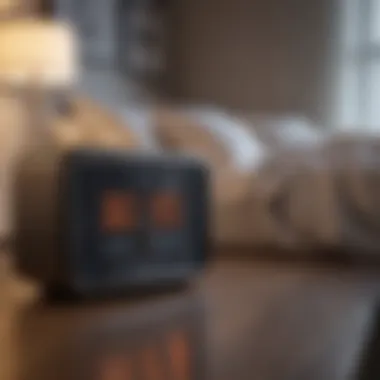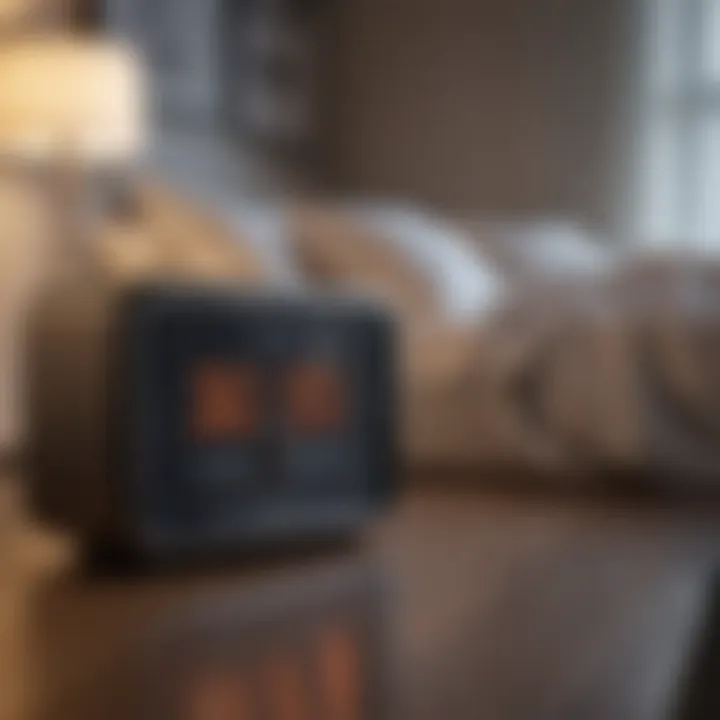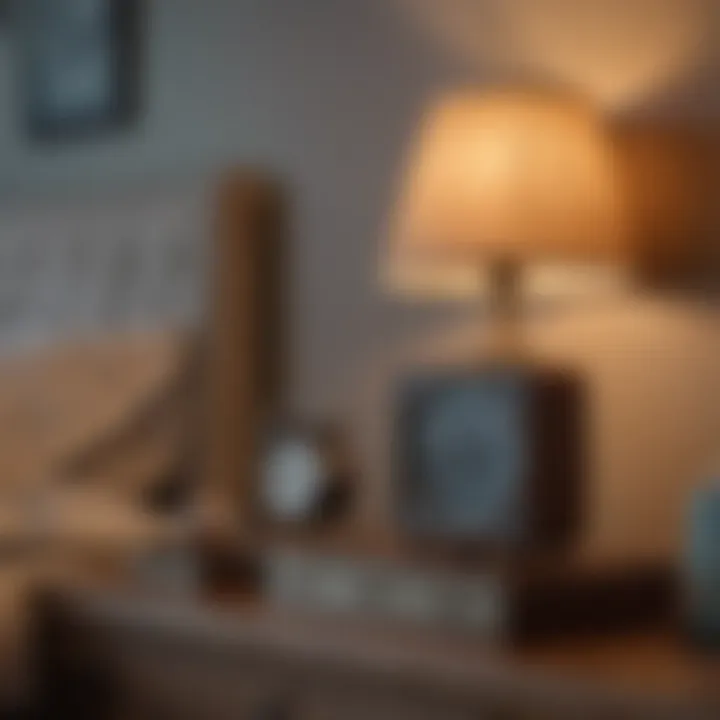Exploring Bedroom Alarm Clocks: Features and Benefits


Intro
In the modern world, a bedroom alarm clock is more than just a tool for waking up. It serves as an essential part of daily routines and plays a significant role in sleep hygiene. With various types available, understanding the features and benefits of these clocks is paramount for making an informed choice. This guide unfolds key aspects to consider when selecting the perfect alarm clock to enhance your waking experience while aligning with your bedroom aesthetic.
Trending Styles
Modern Minimalism
In recent years, many homeowners have gravitated towards modern minimalism in design. Alarm clocks embodying this style are often sleek and functional. They feature clean lines with a focus on simplicity and usability. This design ethos caters to the contemporary bedroom, offering streamlined options that complement other minimalistic furnishings.
The allure of a minimalistic alarm clock lies in its ability to fit seamlessly into any space without overwhelming the decor. Look for clocks made of quality materials, such as metal or wood finishes. The uncomplicated function of these clocks—just a few buttons and a display—enhances their appeal.
Cozy Rustic
On the opposite end of the spectrum, there is a rising trend toward cozy rustic designs. These alarm clocks often incorporate natural materials like reclaimed wood and soft textiles, invoking a sense of warmth. Cozy rustic clocks are attractive for those who appreciate a touch of nature in their surroundings. They can often include vintage-inspired elements, appealing to those with a fondness for heritage.
Such designs promote a sense of tranquility in the bedroom, making the waking experience more pleasant. The combination of vintage and natural aesthetics can elevate the overall ambiance of the space.
Color Palettes
Calming Neutrals
When choosing a bedroom alarm clock, color is of substantial importance. Calming neutral tones such as whites, greys, and soft beiges can effectively create a serene environment. These colors do not distract and can blend well with a variety of bedroom designs, ensuring that the clock enhances rather than detracts from the overall decor.
Neutral palettes help in establishing a relaxing atmosphere conducive to sleep. Many brands offer options in these soothing shades, making it easier to find one that suits your personal style.
Bold Accents
For those who prefer to make a statement, bold accents can invigorate a bedroom space. Alarm clocks in striking colors or unusual patterns can serve as focal points. Bright reds, deep blues, or vibrant greens can introduce energy and excitement into your daily waking rituals. Choosing bold colors might reflect your personality and can serve as a reminder to begin the day with enthusiasm.
"The right alarm clock can transform how you perceive your mornings."
Prologue to Bedroom Alarm Clocks
In an age where technology governs more aspects of our daily lives, bedroom alarm clocks still hold a significant place. They serve not just as devices to wake us in the morning, but they contribute to structure and routine. Selecting the right alarm clock can be pivotal for many individuals striving for a balanced lifestyle.
These devices play a crucial role in setting the tone for a productive day. With the right features, people can better manage their sleep schedules and wake up feeling refreshed. Effective use of an alarm clock helps in reinforcing habits that align with one's priorities. These benefits make exploring the options and features of alarm clocks worthwhile.
With the variety available today, one should consider several factors before making a choice. Many consumers often overlook the importance of aesthetics and functionality working in concert. A bedroom alarm clock should blend seamlessly into the environment while providing reliable performance.
This article will guide you through various types of alarm clocks available, their key features, and how to select one that fits your unique requirements and style.
Importance in Daily Life
Alarm clocks are more than just tools for waking up; they are fundamental in cultivating a structured daily routine. In many households, they signal the start of the day, influencing productivity levels. By setting a consistent wake-up time, alarm clocks help individuals build habits around sleep which most commonly results in improved overall well-being.
With the rising trends of work-from-home setups, the discipline of a morning routine becomes even more crucial. Incorporating an alarm clock into one's environment fosters boundary-setting between personal and work life, promoting better time management.
"Having a structured wake-up time can lead to better sleep hygiene."
Finding the right alarm clock can also enhance sleep quality. Alarm clocks with features like gradual volume increase for alarms can ease the waking process, reducing morning grogginess. Moreover, specific models are designed with calming sounds, which may assist in creating a peaceful bedtime environment.
Historical Overview of Alarm Clocks
The history of alarm clocks dates back to ancient civilizations. The earliest form of timekeeping devices can be traced to the sundial used by the Egyptians. However, the concept of alarm sounds did not emerge until much later. In the 14th century, determined inventors began developing more sophisticated timekeeping mechanisms, leading to the creation of the mechanical clock.
The first recorded alarm clock which could be set for different times was designed by Levi Hutchins in 1787. It rang at 4 a.m. daily to ensure he could arrive on time for work. This was more of a personal necessity than a widespread tool.
With the 19th century's industrial revolution, the need for precise timekeeping became significant, leading to advancements in alarm clock technology. The introduction of the electric alarm clock in the early 20th century marked another major progression with increased accessibility and functionality.


Today, alarm clocks are no longer limited to the mechanical or electric forms. They have evolved into smart devices attached to our digital lives.
Understanding this evolution is essential when exploring the various types and features available in the market today.
Types of Bedroom Alarm Clocks
The choice of alarm clock can significantly affect your daily routine and sleep quality. Different types of alarm clocks cater to distinct needs and preferences. Understanding the types can help you find the best fit for your lifestyle. Here, we explore several types of bedroom alarm clocks, their benefits, and some considerations for each type.
Digital Alarm Clocks
Digital alarm clocks are prevalent due to their functionality and precision. They often feature LED or LCD displays which show the time in clear numerals. One advantage of digital clocks is their straightforwardness. Most models allow for easy setting of alarms and often include features such as a built-in calendar and temperature display.
Additionally, many digital alarm clocks include USB ports for charging devices, making them dual-purpose items in the bedroom. They can also come with adjustable brightness settings, allowing users to control how bright the display is at night. This can help minimize disruption during sleep.
However, potential buyers should consider that the sound quality of alarms can vary significantly. Some may find the standard beeping alarming and unpleasant, while others may prefer nature sounds or music options.
Analog Alarm Clocks
Analog alarm clocks offer a classic aesthetic appeal that many find soothing. These clocks usually feature a traditional clock face with hour and minute hands. This simplicity can provide a charming touch to bedroom decor.
The benefits of an analog alarm include minimal electronic noise, creating a more tranquil sleep environment. They are often powered by batteries, ensuring functionality during power outages. Moreover, the absence of excessive features allows users to focus solely on the time and the alarm.
However, people who prefer precise timekeeping might find analog clocks less appealing. In addition, those with vision impairments may have difficulty reading smaller clock faces, thus warranting careful consideration before selection.
Smart Alarm Clocks
Smart alarm clocks integrate technology into the traditional concept of alarm clocks. These devices can connect to Wi-Fi and often feature voice assistance capabilities. Users can control the alarm through voice commands and even integrate them into smart home systems.
Among their advantages, smart alarm clocks offer customization. They allow users to select their preferred alarm sounds, from soothing music to news updates. Many also include wake-up light features that gradually increase the light brightness, simulating a natural sunrise, which can promote better waking experiences.
Still, potential buyers might ponder the complexity of use. Some may find the setup process cumbersome, especially if they are not tech-savvy. Moreover, reliance on Wi-Fi can be seen as a hindrance if the connection is unreliable.
Projector Alarm Clocks
Projector alarm clocks stand out for their ability to display the time on walls or ceilings. This feature can be particularly beneficial for those who prefer not to turn their heads to view the time. It allows for a more effortless way to check the time without disturbing sleep.
The added benefit is that projector alarm clocks often come with multiple alarm settings, allowing for diverse waking options. Many also include sound and ambient light functions that can enhance the waking experience.
However, these models can occupy more space and may not appeal to those who favor minimalism in design. The projection quality might vary, and some projections may not be clear in bright light conditions. It’s important to consider placement and room light when selecting this type of clock.
"Selecting the right alarm clock can significantly enhance your room's functionality and aesthetic appeal, impacting your overall sleep quality."
Key Features to Consider
Choosing the right alarm clock involves more than just picking a model that looks good. Several key features are essential in ensuring that the clock not only meets the aesthetic preferences of the bedroom but also fulfills the functional needs of its user. Each of these features contributes to the overall experience of waking up and managing time effectively.
Display Type and Size
The display of the alarm clock plays a crucial role in usability, especially during the night. Digital displays are common and come in various formats, including LED and LCD screens. Brightness adjustment is an important factor to consider; many clocks allow you to dim the display for a restful sleep while still being visible when needed.
The size of the display should also be taken into account. A larger display makes it easier to read the time from a distance, which is particularly important for those who may have difficulty seeing clearly in low light conditions. Additionally, some models feature projection capabilities, allowing the time to be projected onto surfaces like walls or ceilings, offering another option for visibility.
Sound Quality and Alarm Tones
The sound produced by an alarm clock significantly affects the waking experience. Alarm sounds can range from gentle beeps to more aggressive tones. Higher sound quality enables clearer, sharper alarms, which may be essential for deep sleepers. Users should look for clocks that offer a variety of alarm tones and volume levels.
Some models even provide natural sounds, like birds chirping or ocean waves, which can stimulate a more pleasant waking process. This feature can also be beneficial for those who struggle with abrupt awakenings. Experimenting with different sounds can help identify what works best for each individual.
Snooze Functionality
The snooze function is a common feature that can make a big difference in how one manages their wake-up routine. This function allows a brief extension of sleep before needing to wake again. However, the duration of the snooze period varies by model, typically ranging from five to ten minutes.


While it can be tempting to hit snooze frequently, it is important to consider the potential negative impacts on sleep quality. Regularly using this function can contribute to fragmented sleep, making one feel groggier. For a healthier approach, consider an alarm clock that encourages rising rather than repeated snoozing, possibly with features that promote gradual awakening.
Power Source Considerations
When selecting a bedroom alarm clock, the power source should not be overlooked. Most clocks are either battery-operated, plug-in types, or a combination of both.
Battery-operated clocks offer portability and reduce concerns about power outages; however, users must regularly check and replace batteries to ensure functionality. Plug-in models eliminate this concern, but may not operate in case of power failures. Hybrid models offer the best of both worlds by providing backup battery power when needed. Choosing the right power source should align with personal preferences and lifestyle.
The ideal alarm clock is one that meets both aesthetic desires and functional needs, helping establish a healthy routine and promoting quality sleep.
In summary, when considering the features of alarm clocks, it’s essential to assess the display type and size, sound quality, snooze functionality, and power source. Each feature affects how well an alarm clock fits into your life and ultimately supports better sleep hygiene.
Aesthetic Considerations for Bedroom Alarm Clocks
Aesthetic considerations are critical when selecting a bedroom alarm clock. These devices are not only functional but also serve as an integral part of bedroom decor. A well-chosen alarm clock can enhance the overall look of the space and create a cohesive atmosphere. Aesthetic appeal can affect how you feel in your bedroom and can reflect personal style. This section explores various aspects of design, materials, and colors that influence the aesthetic value of alarm clocks.
Design Trends in Alarm Clocks
In recent years, design trends for alarm clocks have shifted considerably. Many manufacturers have introduced minimalist designs that prioritize simplicity and elegance. For instance, alarm clocks with clean lines and subtle functions are more common. The emphasis is on functionality without excessive ornamentation. Smart alarm clocks are often designed to blend seamlessly with modern home decor, showcasing sleek surfaces and advanced interfaces.
Moreover, retro designs have seen a resurgence. Vintage-style clocks appeal to those who appreciate classic aesthetics. This trend combines nostalgia with contemporary functionality. The right design can give your bedroom a unique character, enhancing its overall atmosphere.
Material Options and Durability
The materials used in alarm clock production play a key role in both durability and design. Common materials include plastic, wood, and metal. Plastic clocks tend to be light and affordable but may lack the premium feel some users prefer. Conversely, wooden alarm clocks offer a warm, natural look and can integrate well with traditional or cozy bedroom styles. They are often more durable and can provide a more upscale appearance.
Metal alarm clocks, on the other hand, can convey a more modern impression and are often very sturdy. The choice of material impacts both durability and aesthetic appeal, directly affecting the longevity of the product. Therefore, considering material options is important when selecting an alarm clock that will last and enhance your bedroom decor.
Color Schemes and Bedroom Harmony
Color plays a significant role in the aesthetic consideration of alarm clocks. A clock's colors should complement the overall color scheme of the bedroom. Neutral tones like black, white, or gray often work well as they can match various styles and palettes. Soft pastels or bold colors can serve as statement pieces, adding a pop of interest to a subtle bedroom design. It is essential to consider how the clock fits among other elements in the room, such as bedding, curtains, and furniture.
Creating harmony in your bedroom requires thoughtful consideration of colors and designs. A well-suited alarm clock can bring balance and enhance the tranquility of the space. Proper color coordination may contribute to a more peaceful sleeping environment, which is a key aspect of sleep hygiene.
"Aesthetic considerations are about creating a serene and functional space that reflects personal taste and enhances daily living."
In summary, aesthetic considerations for bedroom alarm clocks significantly influence their integration into personal spaces. Understanding design trends, material options, and color schemes allows consumers to select alarm clocks that enhance their bedroom's beauty and functionality.
The Role of Alarm Clocks in Sleep Hygiene
Alarm clocks play a pivotal role in promoting sleep hygiene. They assist individuals in establishing routines that contribute to better rest, thereby underpinning overall health and well-being. Understanding this relationship can help consumers make informed decisions about which alarm clock to choose, aligning with their personal habits and preferences.
Establishing a Regular Sleep Schedule
A regular sleep schedule is a cornerstone of effective sleep hygiene. Alarm clocks help create consistency by signaling the time to wake up and go to bed each day. Inconsistent sleep patterns can lead to disrupted circadian rhythms, increasing fatigue and reducing productivity.
Having a reliable alarm clock encourages discipline. It can be especially helpful for housewives and homeowners managing multiple responsibilities. The same clock should be used every night to reinforce the habit. When a person wakes up at the same time each day, their body begins to adjust. This can reduce the amount of time needed to fall asleep and can contribute to a more restful night.
Impact on Sleep Quality
The quality of sleep is greatly influenced by how and when one wakes. A sudden, jarring alarm sound can be detrimental, potentially causing stress or impacting mood. Selecting an alarm clock with customizable sounds and volume settings allows the user to tailor the experience to their preference. Softer sounds or gradual volume increase can facilitate a gentler wake-up process that eases the transition from sleep to wakefulness.
Furthermore, the right alarm clock can also help monitor sleep patterns. Some smart alarm clocks feature sleep tracking technology that provides insights into sleep quality, allowing users to make adjustments to their routines based on data. This awareness of one’s sleep habits can empower users to make changes that enhance their nightly rest.
Choosing the right alarm clock is not merely about the ability to wake up on time; it is about supporting a healthier sleeping lifestyle.
How to Choose the Right Alarm Clock
Choosing the right alarm clock is essential for establishing a routine and ensuring quality sleep. The features and design of an alarm clock can influence how effectively it serves its purpose. Understanding your needs and preferences can guide you in making an informed decision.


Assessing Your Needs
When starting your search for an alarm clock, assess your specific needs. Consider how you wake up, the environment of your bedroom, and any personal preferences. For instance, people who struggle with waking up might benefit from loud alarm tones or gradual volume increase.
Think about how much light you prefer in the morning. Some individuals may need a clock with a gentle light feature to simulate sunrise. Additionally, consider if you prefer a digital display or an analog one. Each type offers different benefits, like ease of reading or aesthetic appeal.
Other factors can also play a critical role in your decision. Do you share your bedroom with someone? If so, consider whether they have different needs. Discussing these preferences can lead to a more peaceful sleeping environment for both parties.
Comparing Features
Once your needs are clear, you can delve into the various features that alarm clocks offer.
- Display Type: Digital alarms often provide a clear readout, while analog clocks offer a classic look. Choose determining what is more appealing to you.
- Multiple Alarms: If you and a partner wake up at different times, a clock with multiple alarm settings can be beneficial.
- Snooze Option: Consider the snooze feature. Some people prefer short snooze cycles, while others may need longer intervals.
- Connectivity: Smart alarm clocks may come with Bluetooth capabilities and can play soothing sounds or connect to other smart home devices.
Compare these features with your needs. Read reviews and watch user videos to see how different models perform in real-world situations. This can help avoid surprises after purchase.
"The right alarm clock isn’t just about waking up; it’s about transforming how you start your day."
Budget Considerations
Finally, establish your budget. Alarm clocks vary widely in price, from simple models to high-tech options. Determine how much you are willing to spend and look for options within that range.
If you only need basic features, a simple digital or analog clock usually suffices and is more affordable. However, if your priority is advanced features, such as smart connectivity or customized alarm tones, expect to pay a premium price.
Evaluate whether a higher price translates to better sleep quality or functionality for you. Remember, investing in a good alarm clock can lead to better daily routines and potentially improved sleep hygiene.
In summary, ensuring you pick the right alarm clock involves careful consideration of personal needs, comparing various features, and taking budget constraints into account. Each of these steps contributes to a more informed purchase that meets your lifestyle and enhances your sleeping habits.
Popular Brands in the Market
In the realm of bedroom alarm clocks, the selection of a reputable brand plays a crucial role in ensuring both quality and functionality. The right brand often signifies a commitment to innovation, customer satisfaction, and dependable performance. This article section aims to examine leading alarm clock brands that consistently meet consumer expectations and cover various preferences.
Overview of Leading Brands
Several brands dominate the market of alarm clocks, each offering unique features and characteristics. Notable brands include:
- Philips: Known for their innovative wake-up light alarms, Philips focuses on enhancing the waking experience through gradual light intensity.
- Sony: This brand is popular for its audio quality, providing alarm clocks that often come with superior sound systems for alarms and music playback.
- Travelwey: Recognized for its simplicity and ease of use, this brand appeals to consumers looking for no-frills analog alarm options.
- iHome: iHome offers smart alarm clocks that integrate well with devices like smartphones, facilitating charging and music playing.
- Lenovo: With their smart home products, Lenovo brings technology to the bedside, featuring voice control and smart home integration.
Each of these brands brings attributes that have advanced their reputation, catering to diverse consumer needs.
Brand Comparisons
When comparing brands, it is important to evaluate multiple aspects:
- Functionality: Some brands like Philips excel in their unique features, such as light simulation for a more natural wake-up experience. In contrast, brands like Sony prioritize sound quality, making it a favorable choice for audiophiles.
- Design and Aesthetics: Aesthetic appeal varies by brand. iHome offers modern designs that complement smart home setups, whereas Travelwey provides minimalist and classic designs that fit well in traditional settings.
- Price Range: The cost of alarm clocks can fluctuate significantly. Budget-friendly options often come from brands like Travelwey, while high-end models may be found among Philips or Sony, reflecting their innovative functionalities.
- Customer Reviews and Satisfaction: It is essential to consider consumer feedback when making a choice. Checking platforms like Reddit or product review sites can provide insight into real-world experiences.
Ultimately, selecting the right brand can enhance the overall experience with an alarm clock, leading to better sleep hygiene and more effective morning routines.
End
The conclusion of an article serves as a crucial part of summarizing and reinforcing the key insights discussed throughout. In this context, the exploration of bedroom alarm clocks is not merely an examination of their physical attributes but an acknowledgment of their integral role in our daily lives. Understanding the features, benefits, and criteria for selection empowers readers to make informed decisions that directly affect their quality of life.
One significant element discussed is the relationship between alarm clocks and sleep hygiene. By establishing a regular sleep schedule, consumers can enhance not only their rest but also their overall well-being. Alarm clocks serve as a facilitator in this process, reminding individuals to respect their sleep cycles. Therefore, choosing the right alarm clock is more than just a functional choice; it's also a step towards better health.
Another important aspect is the variety of options available in the market. From digital to smart clocks, the diversity caters to different needs and preferences. This variety also raises considerations regarding aesthetics and environmental harmony in the bedroom. Aligning the clock's design with one’s personal style contributes to a soothing atmosphere, essential for relaxation at the end of the day.
In essence, the conclusion reinforces that bedroom alarm clocks are multifaceted tools that influence not only our wake-up routines but also our broader sleep practices. An informed choice about alarm clocks can yield benefits that extend beyond mere timekeeping.
Recap of Key Points
- Alarm clocks aid in establishing regular sleep schedules, which improves sleep quality.
- The market offers a range of alarm clock types, ensuring options for varied preferences.
- Aesthetic considerations are vital for pairing alarm clocks with bedroom design.
- Choosing the right alarm clock contributes to overall well-being.
Final Thoughts on Bedroom Alarm Clocks
In final contemplation, bedroom alarm clocks should be valued not just as utilities for waking up but as essential components of a balanced living environment. A good alarm clock fosters a routine that respects our biological rhythms. Thus, as readers reflect on the points covered, they should recognize the potential for improvement in their lives through careful selection.
Selecting an alarm clock might seem like a small decision, yet it holds greater implications for daily life management and health. By investing time to understand the options, features, and benefits, consumers take an important step towards enhancing their living spaces. Therefore, a thoughtfully chosen alarm clock can become a pivotal part of establishing peace and organization in the home.















